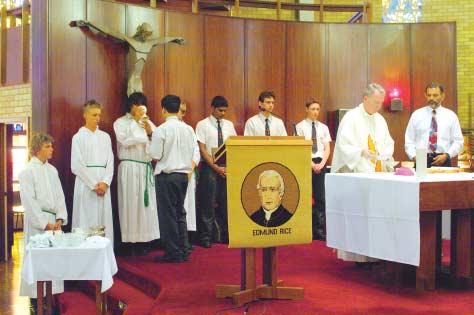
2 minute read
Religious Education
Religious Education
Religious Education is primarily a content directed subject. The intention is to teach the students about the Catholic faith. Pope John Paul calls the Catechism of the Catholic Church a ‘reference text’ and says that is to ‘take into account various situations Mr Gerard Thesiera Dean of Religious Education and cultures while carefully preserving the unity of faith and fidelity to catholic doctrine.’ Through the various texts used at Trinity College we attempt to maintain this unity of faith. The curriculum at Trinity College follows the teaching guidelines of the Catholic Education Office. We involve the students in activities of reflection, journal keeping and discussions, designed to integrate the concepts taught with their own personal experience. The objective is to provide insights from the Catholic/Christian traditions, about their experiences and the many challenges facing the young people of today. One of the most important concepts of Religious Education at Trinity College is the use of the Journal. A journal is a written record of a person’s inner dialogue, the thoughts, feelings, questions, impressions and connections that come to mind over a period of time. All students at Trinity College have to provide a journal specifically for Religious Education. Students can expect to use this journal in every Religious Education lesson. The students can write in response to reflections presented by their teacher, answer to review questions from their Religious Education textbook, or simply record their thoughts and reactions to daily life. The journal is a summary of each student’s work during the year. Generally speaking, the more a student writes in his journal, the more effective the journal process is. Perhaps the best way of approaching the use of the journal is to see it as a conversation between the student and teacher. Writing, in a journal pushes a student to reflect, formulate and meditate. The quality of the writing is expected to be of their best effort. This process is to benefit the writer so he will be able to reflect upon his thoughts. It also teaches each student to take pride in his own thoughts. Teachers mark the student Journal each term. This affirms that the student’s thoughts, reflections and reactions are important and validate their progress. Assessment of the journal also challenges the student to make the effort to improve the quality of presentation and standard of work. What does the future hold? 2005 provides the Religious Education programme with a new vision of assessment. Outcome Statements will be introduced as a form of reporting to parents the progress of each student in Year 8 & 9. This provides Religious Education with further challenges. It will reassess the expectation parents and teachers have of the students at Trinity College in the Religious Education programme.
Gerard Theseira
Head of Religious Education










